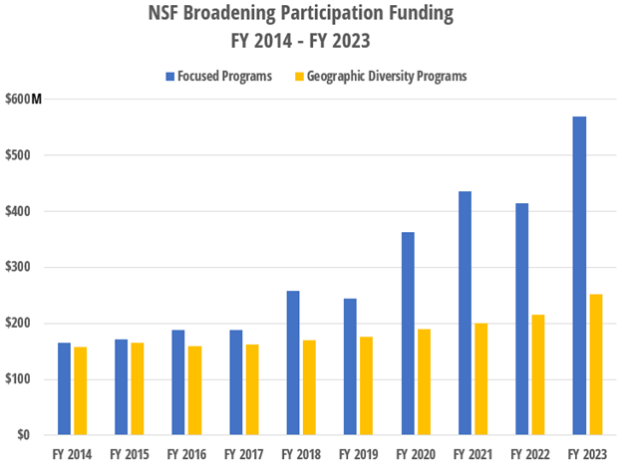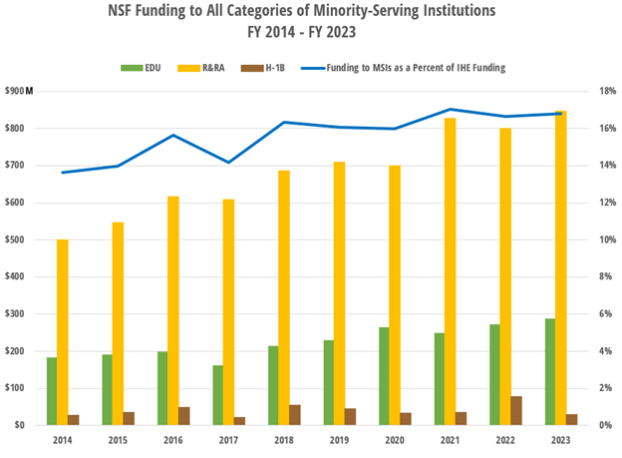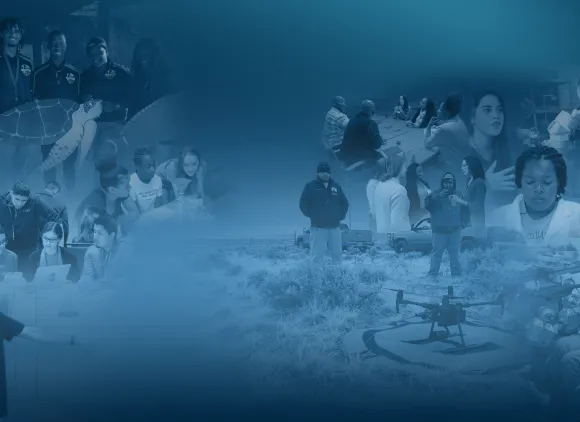About
NSF has taken a variety of budgetary approaches to broaden participation across its many programs. Investments range from capacity building, research centers, partnerships and alliances to the use of co-funding or supplements to existing awards in the core research programs.
Each year, NSF provides two documents that demonstrate its funding of broadening participation activities:
- NSF Programs to Broaden Participation Budget Summary Table.
- NSF Report to Congress on Annual Funding to Minority-Serving Institutions.
NSF's annual funding data for these documents are provided in the sections below.
Programs to broaden participation: Budget summaries
About
Since Fiscal Year 2014, NSF's annual broadening participation summary table has been developed using the three categories and calculations described below.
- Focused programs have broadening participation as an explicit goal of the program. In the budget table, these programs are listed at 100% of their funding.
- Emphasis programs have broadening participation as one of several emphases, but not as an explicit goal of the program. In the budget table, these programs are included at a percentage of their funding level, equaling the 3-year average percentage of a program's award portfolio that meets one or more of the following criteria:
- Award was to a minority-serving institution.
- Award had at least 50% of its principal investigators from an underrepresented group.
- Award had at least 50% of the students or postdoctoral researchers supported by the grant reporting themselves as members of an underrepresented group on project reports.
- NSF's geographic diversity program, the Established Program to Stimulate Competitive Research (EPSCoR), has geographic diversity as an explicit goal of the program. In the budget table, this program is listed at 100% of its funding.

Credit: U.S. National Science Foundation
NSF programs to broaden participation summary tables
(prospective funding estimates by Fiscal Year)
- 2025 summary table
- 2024 summary table
- 2023 summary table
- 2022 summary table
- 2021 summary table
- 2020 summary table
- 2019 summary table
- 2018 summary table
- 2017 summary table
- 2016 summary table
- 2015 summary table
- 2014 summary table
- 2013 summary table
- 2012 summary table
- 2011 summary table
- 2010 summary table
- 2009 summary table
- 2008 summary table
- 2007 summary table
- 2006 summary table
Minority-serving institutions reports
About
Scientists and educators at minority-serving institutions, or MSIs, are crucial to advancing the frontiers of knowledge in the science, technology, engineering and mathematics enterprise. NSF has many programs designed to support researchers at MSIs and broaden participation of outstanding researchers from across a diverse group of regions, institutions and demographic groups. In addition to core research programs, NSF offers numerous funding opportunities that specifically support faculty members, researchers and educators at MSIs.
These reports are prepared annually in accordance with P.L. 107-368, Section 18.

Credit: U.S. National Science Foundation
Reports
NSF Annual Report to Congress on Funding of Minority-Serving Institutions
(retrospective funding data by Fiscal Year)
- 2021 report (PDF)
- 2020 report (PDF)
- 2019 report (PDF)
- 2018 report (PDF)
- 2017 report (PDF)
- 2016 report (PDF)
- 2015 report (PDF)
- 2014 report (PDF)
- 2013 report (PDF)
- 2012 report (PDF)
- 2011 report (PDF)
- 2010 report (PDF)
- 2009 report (PDF)
- 2008 report (PDF)
- 2007 report (PDF)
- 2006 report (PDF)
- 2005 report (PDF)
- 2004 report (PDF)
Contact information
For further information concerning NSF's Broadening Participation programs, please contact:
BP Contacts
Phone: 703-292-8040
Email: broadpart@nsf.gov

